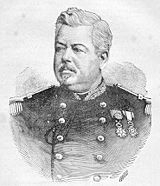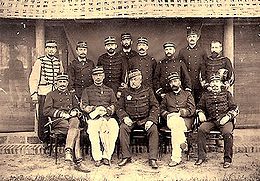
Charles-Théodore Millot
Encyclopedia
Charles-Théodore Millot (1829–89) was a French general who distinguished himself in the Franco-Prussian War
(1870–71) and the Tonkin campaign
(1883–86). His victories at Bac Ninh
(March 1884) and Hung Hoa
brought to an end the two-year undeclared war in northern Vietnam between France and China, and paved the way for the conclusion of the Tientsin Accord
between the two countries on 11 May 1884. Millot resigned as general-in-chief of the Tonkin Expeditionary Corps
shortly after the outbreak of the Sino-French War
on 23 August 1884 and returned to France.
(1827–1896), who had earlier made his reputation as governor of Senegal. The 2nd Brigade was commanded by général de brigade François de Négrier
(1842–1913), a charismatic young Foreign Legion commander who had recently quelled a serious Arab rebellion in Algeria.
 Millot commanded the expeditionary corps for eight months, from February to September 1884. During his tenure of command he organised two major campaigns to capture Bac Ninh and Hung Hoa (March and April 1884) and two more modest expeditions to capture Thai Nguyen and Tuyen Quang (May and June 1884). In the Bac Ninh campaign
Millot commanded the expeditionary corps for eight months, from February to September 1884. During his tenure of command he organised two major campaigns to capture Bac Ninh and Hung Hoa (March and April 1884) and two more modest expeditions to capture Thai Nguyen and Tuyen Quang (May and June 1884). In the Bac Ninh campaign
he won a spectacular walkover victory against Xu Yanxu's Guangxi Army. At the Capture of Hung Hoa
, he flanked Liu Yongfu out of a formidable defensive system without losing a man. Having argued strenuously against sending a column to occupy Lang Son in the heat of the Tonkin summer, he emerged unscathed from the official enquiry into the circumstances of the Bac Le Ambush
(June 1884).
Millot was arguably the most successful of the many commanders of the expeditionary corps, but he was unpopular with both his officers and his men, who considered him overcautious. Significantly, his decision to halt General de Négrier's pursuit of the defeated Chinese forces in the Bac Ninh campaign
was held against him, even though he had sound military reasons for this decision. The troops immediately gave sardonic Vietnamese nicknames to their three generals. The much-admired de Négrier became Maolen ('Quick!'), Brière de l'Isle Mann Mann ('Slow!'), and Millot Toi Toi ('Stop!').
Millot's career in Tonkin ended on a sour note. In poor health, and dismayed at the way the French government used the Bac Le Ambush
as a pretext for war with China, he submitted his resignation in September 1884. In his last order of the day, he described himself as 'a sick and disappointed man'.
Franco-Prussian War
The Franco-Prussian War or Franco-German War, often referred to in France as the 1870 War was a conflict between the Second French Empire and the Kingdom of Prussia. Prussia was aided by the North German Confederation, of which it was a member, and the South German states of Baden, Württemberg and...
(1870–71) and the Tonkin campaign
Tonkin campaign
The Tonkin Campaign was a armed conflict fought between June 1883 and April 1886 by the French against, variously, the Vietnamese, Liu Yongfu's Black Flag Army and the Chinese Guangxi and Yunnan armies to occupy Tonkin and entrench a French protectorate there...
(1883–86). His victories at Bac Ninh
Bac Ninh campaign
The Bac Ninh Campaign was one of a series of clashes between French and Chinese forces in northern Vietnam during the Tonkin campaign...
(March 1884) and Hung Hoa
Capture of Hung Hoa
The Capture of Hung Hoa was an important French victory in the Tonkin campaign .- Background :Hung Hoa was captured by the French a month to the day after the capture of Bac Ninh...
brought to an end the two-year undeclared war in northern Vietnam between France and China, and paved the way for the conclusion of the Tientsin Accord
Tientsin Accord
The Tientsin Accord or Li-Fournier Convention, concluded on 11 May 1884, was intended to settle an undeclared war between France and China over the sovereignty of Tonkin...
between the two countries on 11 May 1884. Millot resigned as general-in-chief of the Tonkin Expeditionary Corps
Tonkin Expeditionary Corps
The Tonkin Expeditionary Corps was an important French military command based in northern Vietnam from June 1883 to April 1886. The expeditionary corps fought the Tonkin campaign taking part in campaigns against the Black Flag Army and the Chinese Yunnan and Guangxi Armies during the...
shortly after the outbreak of the Sino-French War
Sino-French War
The Sino–French War was a limited conflict fought between August 1884 and April 1885 to decide whether France should replace China in control of Tonkin . As the French achieved their war aims, they are usually considered to have won the war...
on 23 August 1884 and returned to France.
Command of Tonkin Expeditionary Corps
In early 1884 the arrival of substantial reinforcements from France and the African colonies raised the strength of the expeditionary corps to over 10,000 men. Its new commander, général de division Charles-Théodore Millot (1829–1889), organised this force into two brigades. The 1st Brigade was commanded by général de brigade Louis Brière de l'IsleLouis Brière de l'Isle
Louis Alexandre Esprit Gaston Brière de l'Isle was a French Army general who achieved distinction firstly as Governor of Senegal , and then as general-in-chief of the Tonkin Expeditionary Corps during the Sino-French War .-Military career to 1871:Louis Briere de l'Isle was born on 4 June 1827 in...
(1827–1896), who had earlier made his reputation as governor of Senegal. The 2nd Brigade was commanded by général de brigade François de Négrier
François de Négrier
General François Oscar de Négrier was one of the most charismatic French generals of the Third Republic, winning fame in Algeria in the Sud-Oranais campaign and in Tonkin during the Sino-French War .- Early career :Born in Belfort, France on October 2, 1839, De Négrier served with Marshal...
(1842–1913), a charismatic young Foreign Legion commander who had recently quelled a serious Arab rebellion in Algeria.

Bac Ninh campaign
The Bac Ninh Campaign was one of a series of clashes between French and Chinese forces in northern Vietnam during the Tonkin campaign...
he won a spectacular walkover victory against Xu Yanxu's Guangxi Army. At the Capture of Hung Hoa
Capture of Hung Hoa
The Capture of Hung Hoa was an important French victory in the Tonkin campaign .- Background :Hung Hoa was captured by the French a month to the day after the capture of Bac Ninh...
, he flanked Liu Yongfu out of a formidable defensive system without losing a man. Having argued strenuously against sending a column to occupy Lang Son in the heat of the Tonkin summer, he emerged unscathed from the official enquiry into the circumstances of the Bac Le Ambush
Bac Le ambush
The Bac Le ambush was a clash during the Tonkin campaign in June 1884 between Chinese troops of the Guangxi Army and a French column sent to occupy Lang Son and other towns near the Chinese border. The French claimed that their troops had been ambushed by the Chinese...
(June 1884).
Millot was arguably the most successful of the many commanders of the expeditionary corps, but he was unpopular with both his officers and his men, who considered him overcautious. Significantly, his decision to halt General de Négrier's pursuit of the defeated Chinese forces in the Bac Ninh campaign
Bac Ninh campaign
The Bac Ninh Campaign was one of a series of clashes between French and Chinese forces in northern Vietnam during the Tonkin campaign...
was held against him, even though he had sound military reasons for this decision. The troops immediately gave sardonic Vietnamese nicknames to their three generals. The much-admired de Négrier became Maolen ('Quick!'), Brière de l'Isle Mann Mann ('Slow!'), and Millot Toi Toi ('Stop!').
Millot's career in Tonkin ended on a sour note. In poor health, and dismayed at the way the French government used the Bac Le Ambush
Bac Le ambush
The Bac Le ambush was a clash during the Tonkin campaign in June 1884 between Chinese troops of the Guangxi Army and a French column sent to occupy Lang Son and other towns near the Chinese border. The French claimed that their troops had been ambushed by the Chinese...
as a pretext for war with China, he submitted his resignation in September 1884. In his last order of the day, he described himself as 'a sick and disappointed man'.

